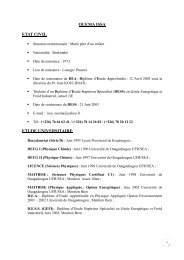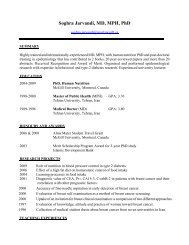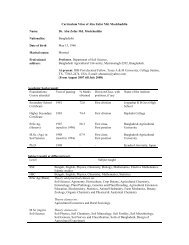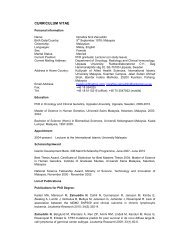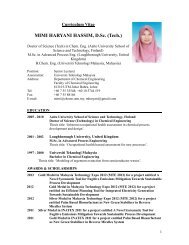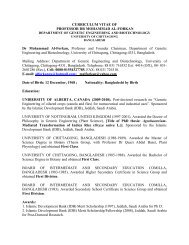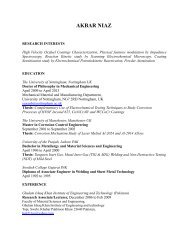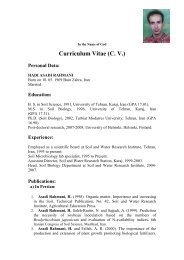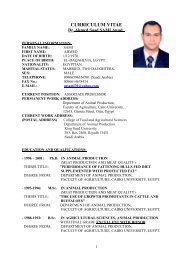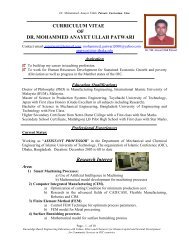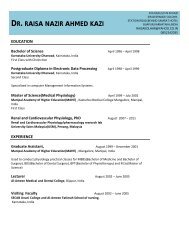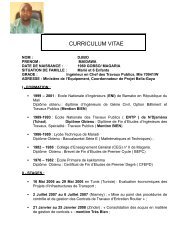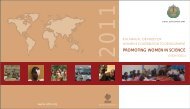Engineering: issues, challenges and opportunities for development ...
Engineering: issues, challenges and opportunities for development ...
Engineering: issues, challenges and opportunities for development ...
Create successful ePaper yourself
Turn your PDF publications into a flip-book with our unique Google optimized e-Paper software.
ENGINEERING AROUND THE WORLDAs the main agent of physical trans<strong>for</strong>mation, technologicalcreation <strong>and</strong> productive innovation, engineering has a centralrole in social <strong>and</strong> economic <strong>development</strong>. However, as in manycountries, this is is often not well understood by policy-makers.This is partly due to rising apathy towards politics, howevera new generation of engineers is working to overcomethis limitation to cooperate in national <strong>development</strong> planning<strong>and</strong> in projects with <strong>for</strong>eign financing. The main engineering<strong>challenges</strong> discussed in Argentina are:■ Improving transport infrastructure, its operation, the modesof transport used <strong>and</strong> safety.■energy Urgently increasing the supply.■Expansion of urban sanitation.■ Better distribution of activities <strong>and</strong> population to reduceinequality <strong>and</strong> trans<strong>for</strong>m in<strong>for</strong>mal settlements.■ Promotion of engineering enrolment, graduation <strong>and</strong> training.Argentina has more than eighty institutions that educate<strong>and</strong> graduate engineers. Of these, seventy are public collegesor national universities (including twenty-four regionalschools of the National Technological University) with freeinscription <strong>for</strong> secondary school graduates, <strong>and</strong> the othersare private <strong>and</strong> paid <strong>for</strong> by the students. Together they offer395 grade courses, of which 376 grant twenty-one specializeddegrees that are selected in a process of curriculumunification being conducted by the Federal Council of <strong>Engineering</strong>Deans (CONFEDI). 102 Courses are completed in fiveyears but statistics show that only 9.6 per cent of studentscomply fully. The dropout rates from these studies is alsovery high. The total numbers of graduate engineers in theperiod 1998–2003 was 11,460 from national universities,10,250 from the National Technological University <strong>and</strong> 4,090from private universities. The main engineering fields werecomputer sciences <strong>and</strong> industrial, electronic, civil, chemical<strong>and</strong> mechanical engineering. It is estimated that, at present,women make up nearly 20 per cent of all engineering students.There are also many courses <strong>for</strong> postgraduate study,which are increasingly in dem<strong>and</strong>.Quality control of engineering courses is part of a system ofaccreditation defined by the Argentine National Law of HigherEducation. The National Council of Evaluation <strong>and</strong> Accreditation(CONEAU) 103 plans evaluations <strong>and</strong> grants programmeslicenses <strong>for</strong> three or six years. Accreditation guidelines <strong>and</strong>102 Federal Council of <strong>Engineering</strong> Deans (CONFEDI). Go to: http://www.confedi.org.ar103 National Council on Evaluation <strong>and</strong> Accreditation, Argentina. Go to: http://www.coneau.gov.arprocedures are similar to those of ABET, the WashingtonAccord <strong>and</strong> the EMF. To improve the usefulness of the system,some engineering institutions consider that the evaluationsshould include the opinion of practicing engineers working inprofessional activities <strong>and</strong> productive sectors.CONFEDI is analyzing, in cooperation with the Secretary ofUniversity Policies of the Ministry of Education, curricula <strong>and</strong>pedagogy 104 with a view to updating engineering educationto deliver the outcomes <strong>and</strong> competences needed <strong>for</strong> 2015.Some guiding concepts <strong>for</strong> this process include: better contextualizationso that engineers can meet the needs of thecountry; more attractive training that increases <strong>for</strong>mative,creative <strong>and</strong> practical activities; closer relations with regionalpopulation, production <strong>and</strong> problems; <strong>and</strong> the considerationof social situations. Many of these concepts were postulatedby UNESCO in the Delors Report105 in 1996, with inspiration<strong>for</strong> engineering education such as ‘learning to know, learningto do, learning to live together <strong>and</strong> learning to be’ as the fourpillars of education throughout life.In the last decades of the twentieth century, Argentinasuffered a costly ‘ brain drain’ of engineers. With economicrecovery, dem<strong>and</strong> is still not being satisfied by the number ofnew graduates. Enrolment in engineering programmes beganto decline in 1990 <strong>and</strong> reached its lowest level between 1996<strong>and</strong> 1999. Economic recovery began in 2000 with policiesencouraging local production; with the result that enrolmentincreased 11 per cent between 2000 <strong>and</strong> 2007. There weresome 30,000 enrolments of engineering students in 2005, butthat same year fewer than 5,000 engineers graduated, showingthat many left at intermediate level.For this reason, the national government is encouragingengineering students to enrol <strong>and</strong> complete their studieswith scholarships <strong>and</strong> funds in order to improve engineeringschools. There are funds to promote the return of highlyqualified Argentine engineers who have left the country. TheOffice of Science, Technology <strong>and</strong> Productive Innovation ofthe national government was upgraded to a new ministry lastyear, <strong>and</strong> it leads promotional programmes to exp<strong>and</strong> <strong>and</strong>enhance engineering education <strong>and</strong> research, <strong>and</strong> their linkswith production. The national government annual budget <strong>for</strong>engineering was estimated to be just less than US$700 millionin 2008, after it was increased at a rate of 16 per cent per yearbetween 2000 <strong>and</strong> 2008. We must also add to this amount thecontributions of private schools <strong>and</strong> productive enterprise toeducate <strong>and</strong> train engineers.104 Secretary of University Policies, Ministry of Education. Go to: http://www.me.gov.ar/spu/105 Jacques Delors. 1996. Learning: the Treasure Within. Report to UNESCO of the InternationalCommission on Education <strong>for</strong> the Twenty-first Century. UNESCO publishing,Paris.243



